
When it comes to bringing traffic to a website, SEO is the key strategy that a digital marketer relies on.
That’s because people do a Google search before buying anything online or offline.
Nowadays, Google search has become a highly competitive landscape and you need to think beyond search result rankings.
In other words, you need to optimize your website to generate branded search.
This will help in increasing the number of branded search queries , high intent traffic to your site, and to maintain positive online reputation.
What is Branded Search?
Branded search (also known as brand-driven search) is search traffic coming from keywords or search queries that consists of your brand or product name.
Your audience will start search for you on Google by using your brand name when they are already familiar with your brand from other sources like social media, TV ads, word of mouth, etc.
Let’s look at an example. When you do a Google search for Ubersuggest (which is a well-known SEO tool), you will find various search queries as suggestions shown below.
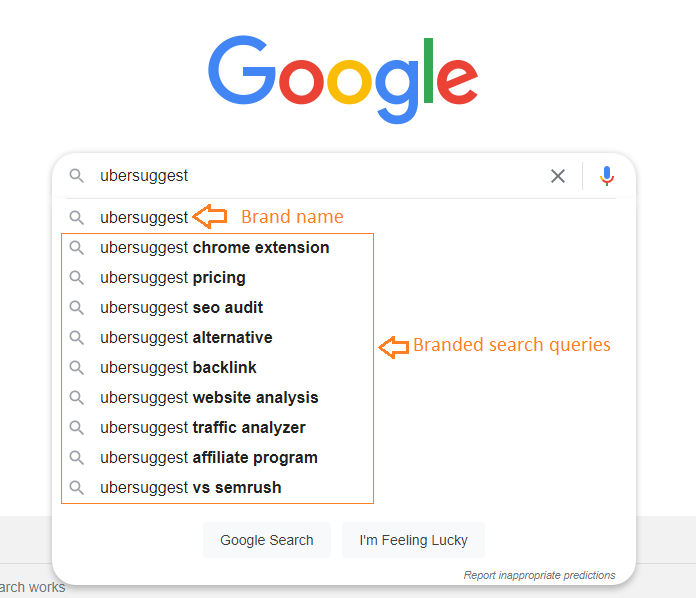
These are actual search queries associated with the product ‘Ubersuggest’ that people (mostly digital marketers) use to search to know more about Neil Patel’s SEO tool.
You can also find more branded search queries for Ubersuggest at the bottom of the Google search results page as ‘Related Searches’.
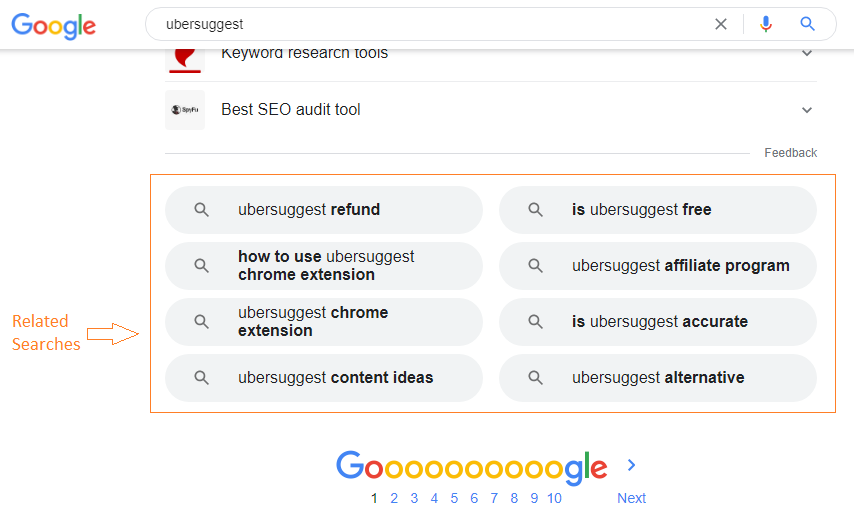
Think about the most-admired brands such as Netflix, Tesla, KFC, and Microsoft that are generating tons of their own branded searches on Google.
More search queries these brands can utilize to optimize their respective websites for conversions.
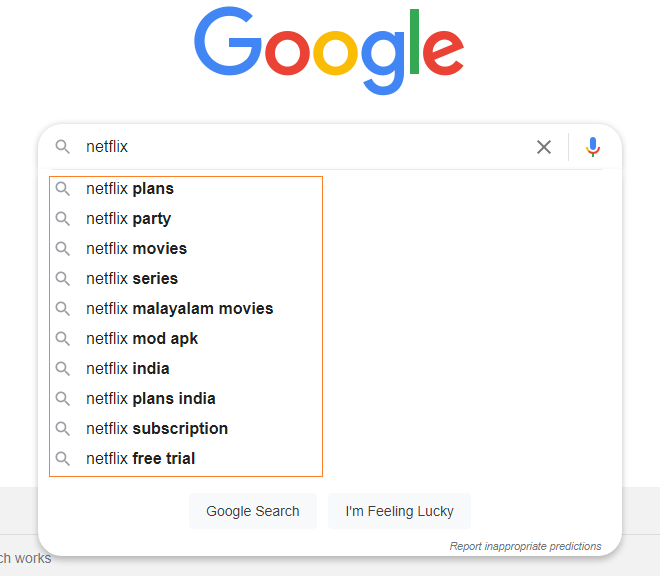
Search queries that do not mention a brand name or any part of it are considered as non-branded or unbranded search queries.
For example, search queries such as “barber shop near me”, “personal finance tips”, “keto diet”, and “best laptops for office work” contain no reference to any specific brand name or product name.
Normally, businesses focus on optimizing for non-branded keywords because of their high search volume that can in turn drive significant amount of traffic to their website.
Hope this gave you clarification on branded vs non-branded search queries.
While targeting non-branded search terms plays an important role in your overall SEO strategy, many businesses still underestimate and neglect the potential of branded search.
Why You Need to Focus on Branded Search?
Search engines, especially Google love brands.
According to Google’s former CEO Eric Schmidt, “Brands are the solution, not the problem. Brands are how you sort out the cesspool.”
Google considers those businesses as strong brands if they:
- Provide right information and value to their audience.
- Recognition from third-party trusted sources.
- Possess great social media presence.
They have even rolled out E-E-A-T update that determines the quality of a website in terms of its expertise, authoritativeness, and trustworthiness.
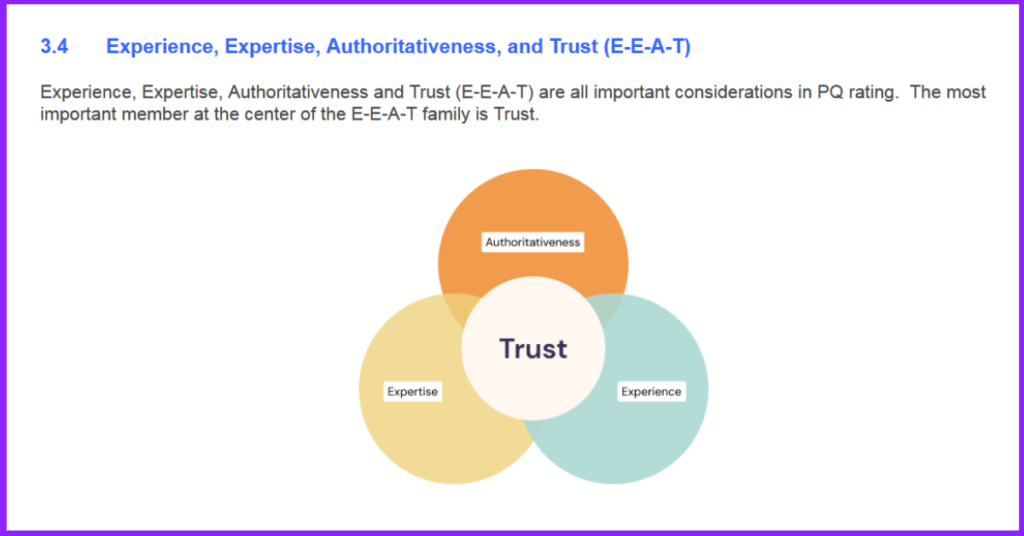
The number of Google searches that mention your brand name directly is a clear indication to Google that you exist outside of the online search space and that you are a real brand that users are interested in.
Also, branded search traffic can influence your overall search result rankings. According to Moz, branded search volume contributes to SERP rankings as much as domain authority.
When you focus your SEO for branded search, you can reap benefits that include:
- High intent traffic which means high CTR
- High conversion rate
- Boosts your direct traffic as well.
- Dominate your SERP real estate.
- Positive impact on your non-branded keyword rankings
- Build and maintain your brand awareness in search engine results.
- Ward off competitors who try bid for your branded keywords.
- Increase in word-of-mouth about your brand in the online space.
10 Ways You Can Build Branded Search Traffic to Your Website
Now comes the question how to increase branded search volume for your website.
Here are 10 ways you can generate traffic from your branded search terms, for your website.
#1 Gather Your Branded Keywords
The first step in your branded search campaign is to find your branded keywords.
You can use your Google Search Console since it is free and almost all websites own an account.
After logging in into your GSC account, open the “Performance” report, click “New” next to the filters.
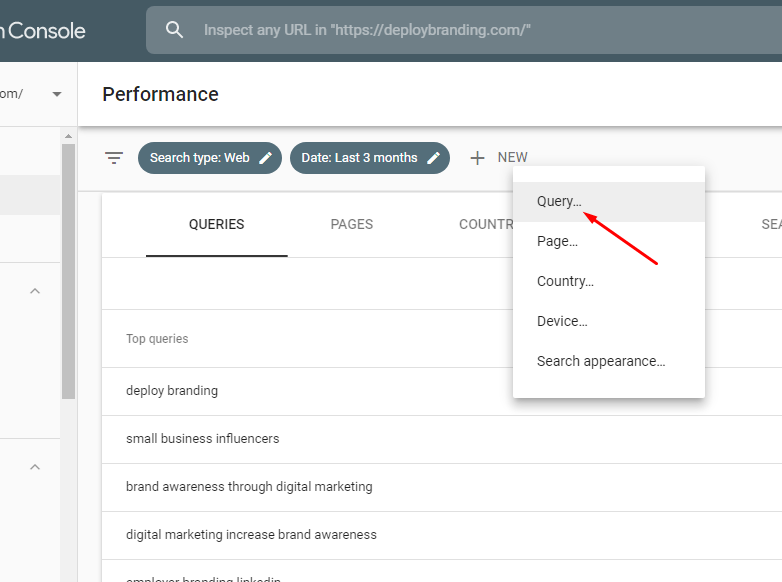
Select “Query” from the drop-down menu, type in your brand name and click the “Apply” button. You can then download the list of your branded keywords as a spreadsheet file.
You can use Google search suggestions and related searches (mentioned earlier in this blog) to find more branded search terms.
Text Optimizer is a great SEO tool that you can use to find most asked questions about your brand.
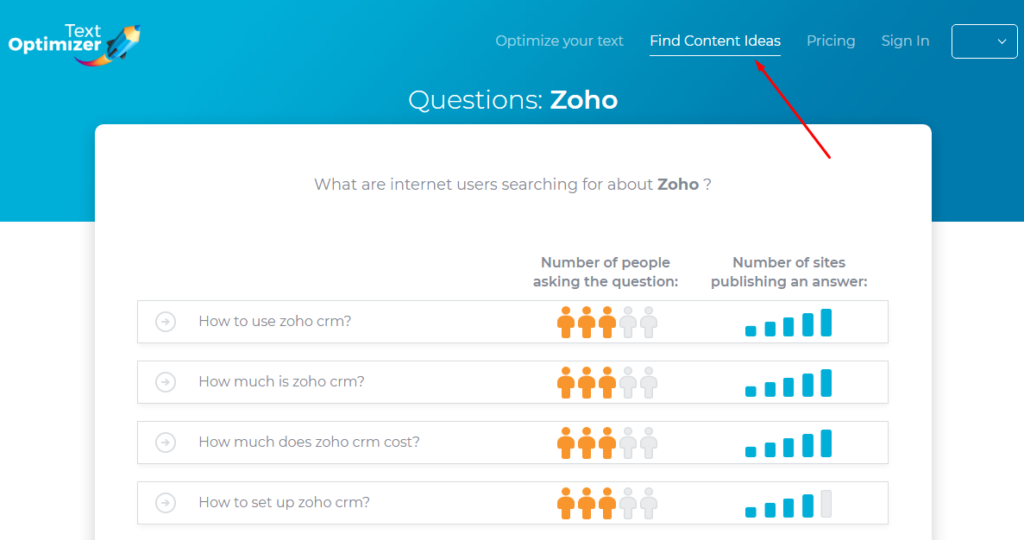
You can filter the list by considering these factors – search volume, number of clicks, and impressions. You can also use advanced tools like Hubspot, Serpstat, ProRankTracker, Semrush, Ahrefs, and Moz that has more filtering options for finding branded queries.
#2 Categorize Your Branded Keywords
After creating a list of your branded search queries, you can divide them into following 3 categories:
- High intent queries – These are usually price-related queries (contain words like “pricing” and “reviews”) that indicate your customers are ready to buy your product/service.
- Navigational queries – Your audience use these branded queries (contain words like “how to”, “FAQ”, “career”, “support” etc) to find a specific page in your website.
- Comparison queries – These branded queries compare you with your competitors. For example, “brand X vs. brand Y” query can be comparison between your product/service with that of your competitor.
- Informational queries – These queries provide general information regarding your products/services, top management, and about your organization as whole.
There are some branded search queries that can labeled as more than one type. You can keep a separate category for them.
You can use this organized list of queries to further enhance the ROI of your ongoing SEO or content marketing campaign.
#3 Create Content Based on Your Branded Queries
You can easily rank your content for your branded queries since they have virtually zero competition.
By analyzing your branded search queries, you can find content gaps in your website that can be filled with blogs, FAQs, service/product information, and resource articles.
Using high-intent queries, you can create (or update existing) webpage content that will speed up your sales conversions.
If there are any branded searches related to your reputation, you can fix it with press releases, testimonials, and reviews from trusted, third-party platforms.
Don’t forget about schema markup when optimizing your website content.
You can use and repurpose the same content in your social media campaigns as well.
Since social media helps in building brand awareness, it can help in driving branded search and direct traffic to your website.
#4 Dominate Your SERP Real Estate
When you search your brand name on Google, the first page of search results will contain your website (in the first position) followed by your social media profiles, reviews from third-party websites, and business directory listings.
This is your normal search engine results page (SERP) real estate.
If you have a local business presence, then your Google My Business pack (appear on top right side) and few local directory listings will also show up in the first page.
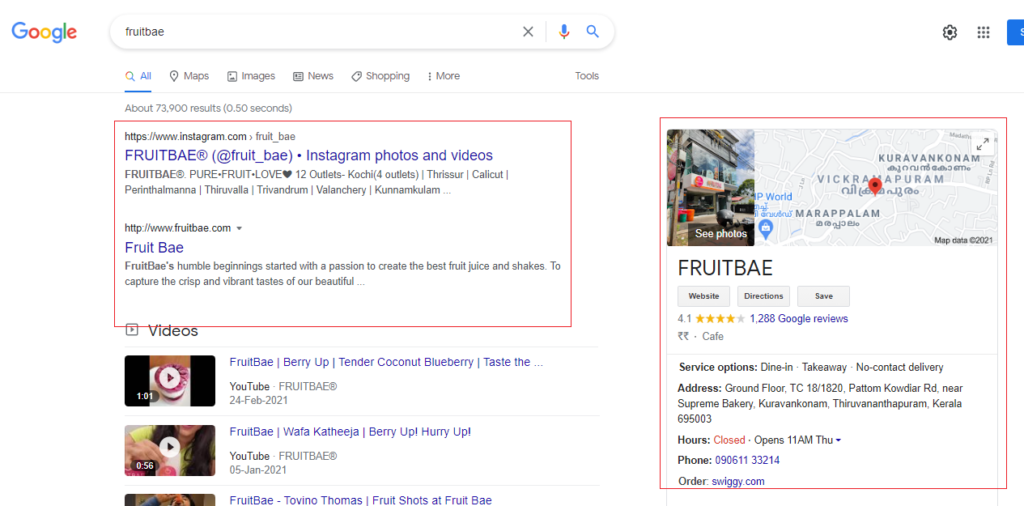
Or, if you are a well-recognized brand then your own knowledge graph appear on top right side of the page.
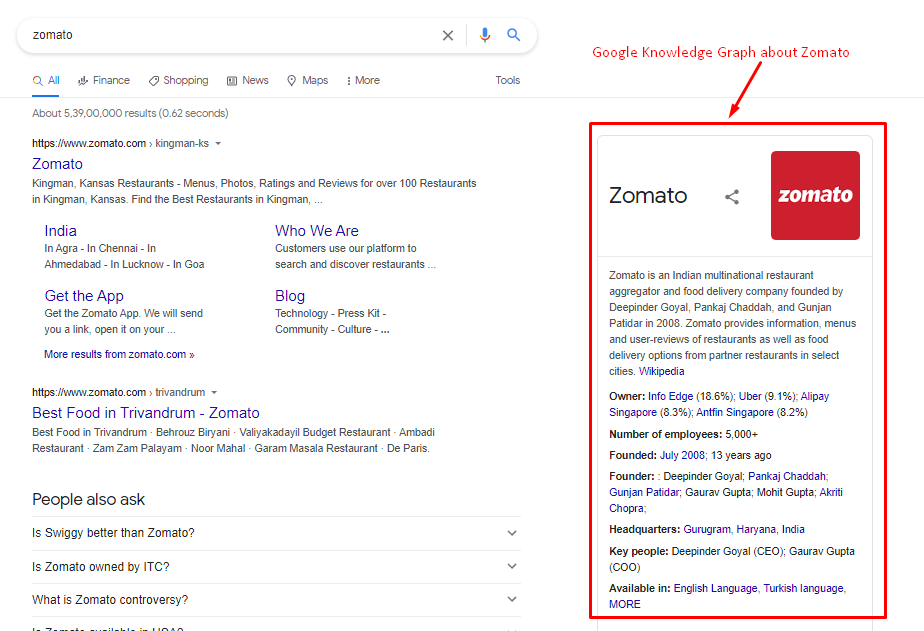
By now, I hope you’ve got the idea of what SERP real estate really means.
You need to dominate the first page of your brand search results i.e. your SERP real estate.
This is to make sure that your branded search traffic won’t divert to other websites especially your competitors.
You can start with generating sitelinks which are sub-listings that comes under your business website on Google search results. This is what sitelinks look like:
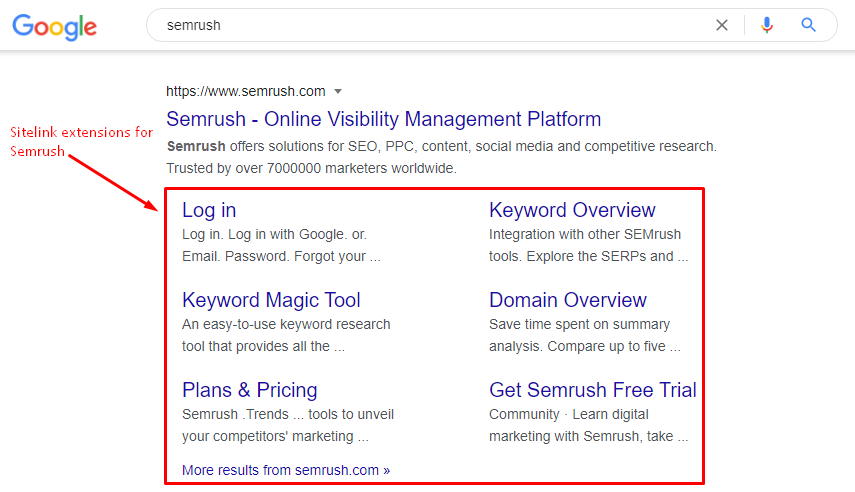
You need to optimize your webpages (especially the important ones) so that Google will show these pages in the search results as sitelinks.
Keep in mind that it’s Google that decides to whether to show your sitelinks or not.
Also, your brand name needs to be unique and your brand must be well recognized to your target audience.
If you are very much active on social media then your brand pages will show up in the search results.
Recent tweets from your Twitter brand page will be displayed in the search results. This occurs when you are active and consistent in posting tweets on your Twitter page.
If you have a physical presence, optimize and maintain your local business directory listings that include your Google My Business account.
#5 Monitor Your Brand Mentions
When you become an established brand, it’s common that people start mentioning your brand in their online and offline conversations.
You can monitor brand mentions on high-authority websites and social media channels using Google Alerts, Buzzsumo, and other third-party brand monitoring tools.
Using these brand mentions, you can create backlinks and raise your brand reputation online.
This in turn helps in increasing your ‘high-intent’ (direct) traffic and creates more brand-driven searches for your website.
I have already made a post on how brand monitoring helps SEO.
In that post, I’ve explained the strategies for finding brand mentions, creating backlinks, and tips to grow (and maintain) your online reputation.
#6 Being an Employer Brand Really Helps
When your company is recognized as a good employer that means job aspirants will find you through online search.
When there are branded queries related to jobs, you can optimize your careers webpage accordingly. [Create a dedicated page if you don’t have one.]
Fill up the page with employee feedbacks, work culture, employee benefits, events, and of course, job openings.
You can use structured data in your careers page to display your recent job postings on Google search results.
For example, when you search for “Facebook jobs”, this is how it will look like:
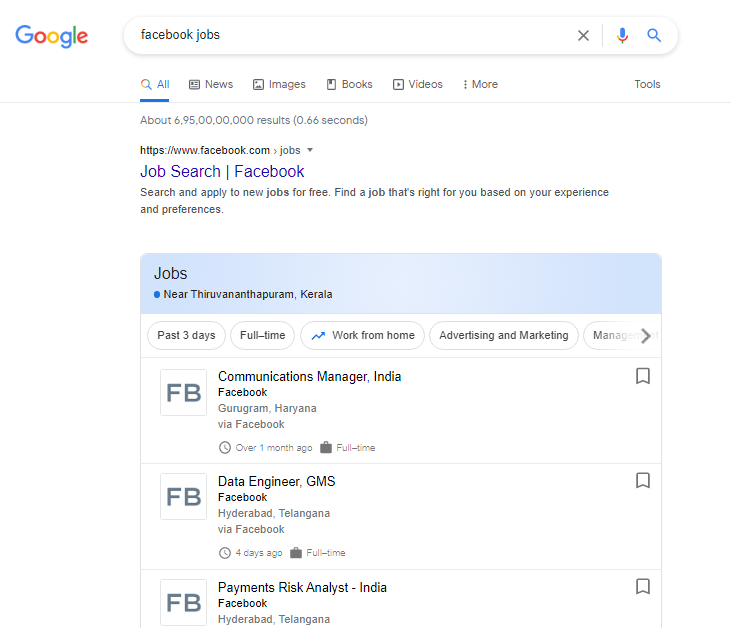
You can also monitor employee review websites and job portals (like Glassdoor, Monster, Indeed, etc) to maintain your employer reputation on third-party platforms.
Don’t forget about Linkedin which has 750+ million active members and a growing professional networking platform suitable for building your employer brand.
When people start to acknowledge you as an employer brand, it will indirectly help your overall branding as well. This in turn increases your branded searches on Google.
#7 Collaborate with Influencers
Collaborating with influencers is another great way to generate branded searches.
These influencers can be web bloggers and social media content creators who can help you in amplifying your brand voice.
For getting better results, you need to collaborate with that influencer whose followers come under your target audience.
They can mention your brand in their content or they can create content about your product/service that will be shared with their followers.
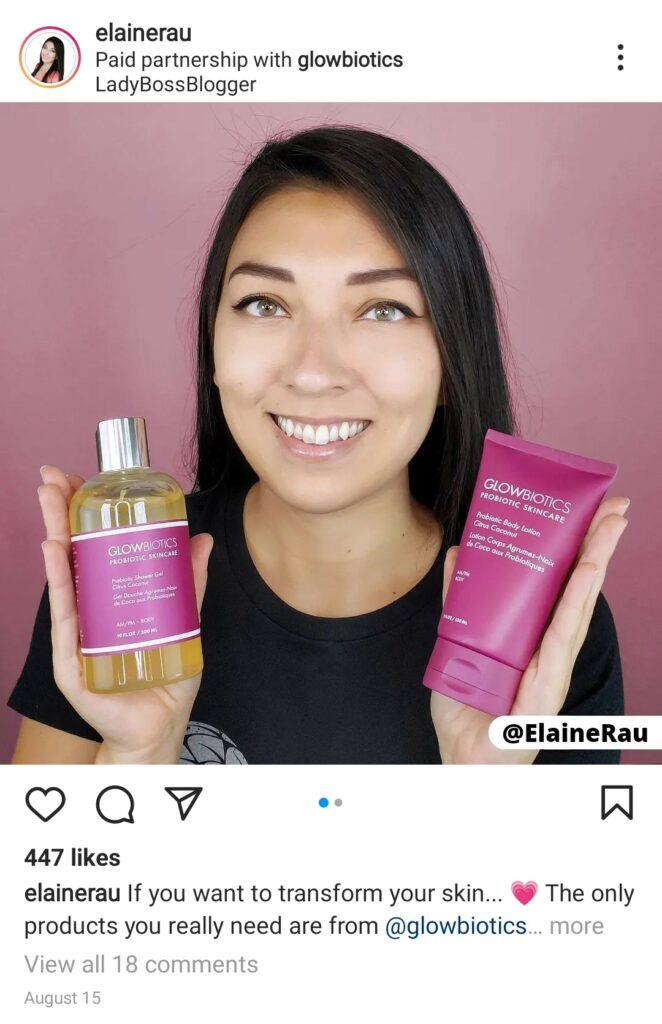
This will certainly generate word-of-mouth publicity and brand-driven searches on Google to know more about you.
It all depends on how much you are willing to pay for influencers with million plus followers.
You can approach nano-influencers who are niche-specific and have small yet highly engaging followers.
#8 Block Competitors From Bidding Your Branded Queries
When you generate considerable branded queries (with high clicks and search volume) then there are high chances for them to undergo competitor bidding.
It is when your competitors bid on your branded queries and place their ads on top of your website listings in Google search results.
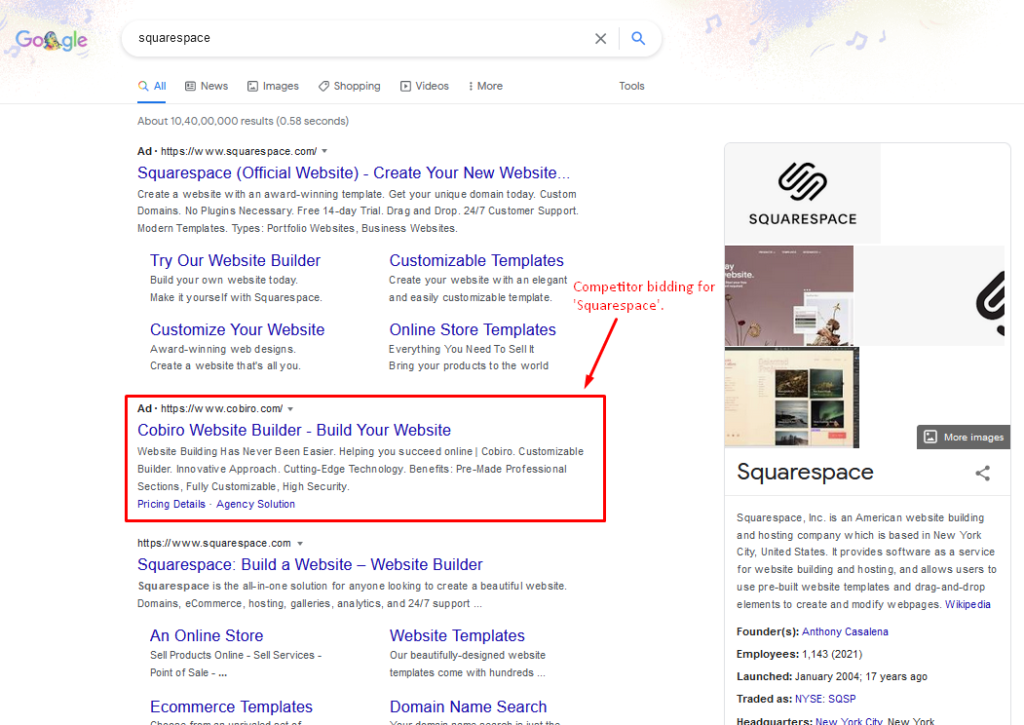
showing a competitor ad in the 2nd position
You need to avoid that as it will drastically reduce branded search traffic to your website.
The only way to prevent competitor bidding is to display your own ads for the same branded queries.
Since the cost-per-click (CPC) is very low for branded queries compared to their unbranded counterparts, you can place your ads for queries your competitors trying to bid on.
Not only that you can block competitors from bidding on your branded queries also you can use Google ads to boost your branded search traffic.
Through your search ads, it is easier to get the attention of your target audience towards new product/service launches, upcoming events, discount sales, brand awareness, etc.
#9 Don’t Forget About Other Search Engines
We know that Google is the dominant player with around 92% market share in the search engine space worldwide, according to Statcounter.
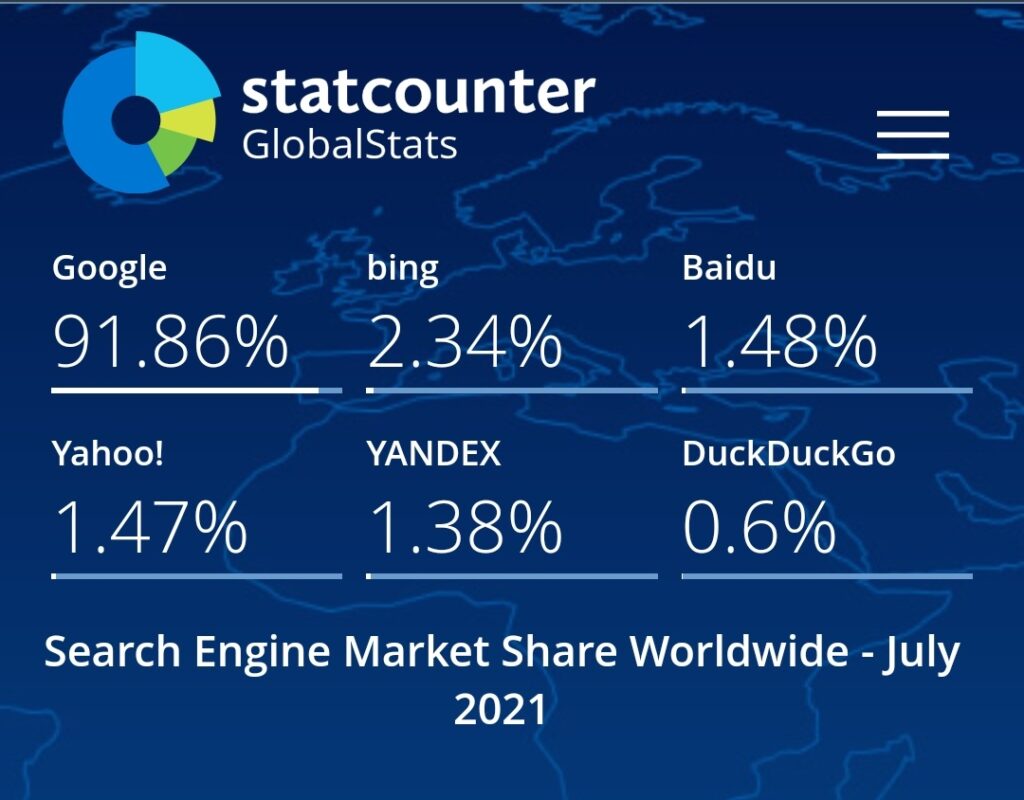
Still there are other players like Bing, Yahoo, and DuckDuckGo that have considerable presence in countries like US, Canada, Germany, UK, Japan, and Australia.
Also, keep in mind that Google is not the dominant search engine in every country.
For example, Baidu and Yandex are the largest players in China and Russia respectively.
You can use Statcounter Global Stats to determine the current market share of search engines in selected countries.
The competition in these search engines is very less compared to Google.
That means you can optimize and rank your website easily on Bing, DuckDuckGo, and Yahoo thereby gaining extra search traffic for your website.
In time, you can generate your branded searches on these search platforms as well.
#10 Create Brand Awareness – For New Businesses
Now you know that branded searches will appear on Google only when you are an established and recognized business.
If your business is relatively new to your target audience then the occurrence of branded search queries (other than your brand name) on Google will be zero.
You need to create brand awareness through digital marketing for recognition and for boosting your sales conversions.
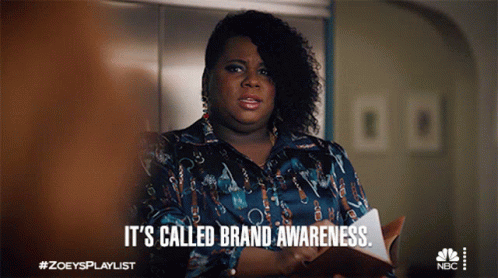
When you continue this process for a certain period of time, people will start talking about your business, their buying experience, and thereby acknowledges you as a brand.
Final Thoughts
You can expect best results from your SEO campaign when you focus your efforts on both branded and non-branded searches.
What do you think about this post? Do share your thoughts on branded search in the comments.
